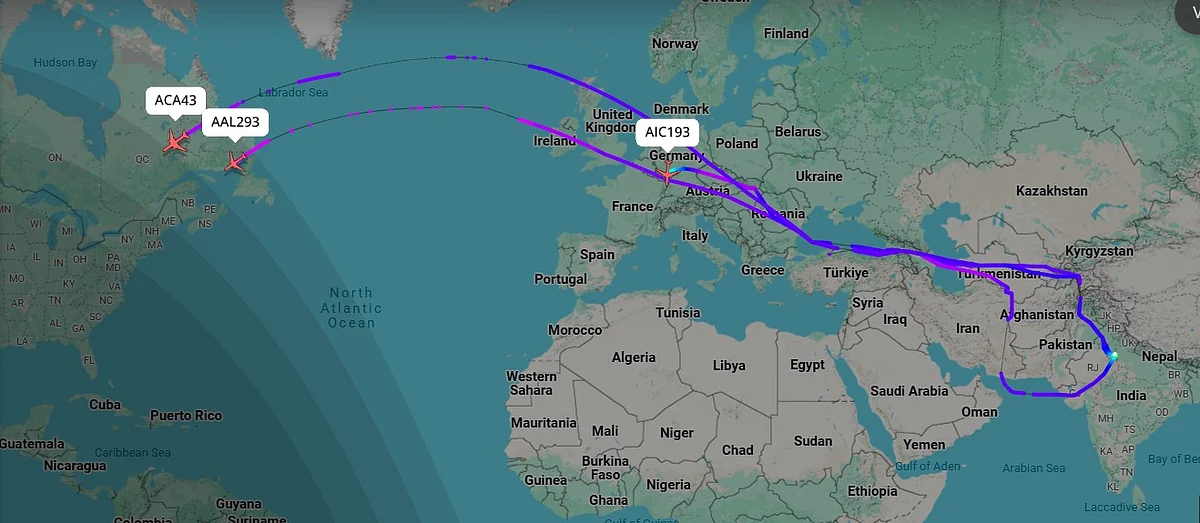Pak, Iran Airspace Shut: Flights Hit; Tickets, Goods Prices to Soar, Experts Say
'Air space closures mean longer routes as aircraft will have to circumvent the countries that have issued the NOTAM'

advertisement
Multiple international flights faced disruptions due to air space closure over Israel, Iran, Iraq and Jordan after Israel launched airstrikes in Iran on Friday, 13 June. With the Pakistani air space already closed for India post-Operation Sindoor, air travel from northern India to Central Asia and the West is set to get longer and more expensive.
At least 16 international Air India flights were diverted or forced to return to their origin after the closure of the Iranian air space. Several aircraft had to re-route mid-flight. In a post on X (formerly Twitter), the airline stated:
(Screenshot: X)
(Screenshot: X)
(Screenshot: X)
12 Air India flights arriving in India from London, New York, Newark, Chicago, Washington, Toronto and Vancouver had to be diverted to Sharjah, Jeddah, Frankfurt, Milan and Mumbai. Meanwhile, four flights had to return to Delhi and Mumbai.
Flight Operator IndiGo too issued an advisory, alerting travellers of “potentially longer travel times and cancellations.”
Delhi’s Indira Gandhi International Airport (IGIA) issued an advisory for travellers on schedules impacted due to the evolving airspace conditions over Iran, Iraq, and the neighbouring region.
Airspace Closures to Send Travel Industry Into a Tailspin
Aviation expert KP Sanjeev Kumar explained to The Quint that airspaces are closed by warring nations to protect their assets. He said, “Even though closures are not permanent, they have a cascading effect of the economy and can potentially send the travel industry into a tailspin.”
Airspace closures not only affect travel but also imports and exports to other countries in addition to trade with countries which have closed the airspace.
The closures of airspace over Iran, Iraq, Jordan and Israel are immediately affecting long-haul corridors between Europe and the Gulf, and Asia and North America—particularly the routes connecting India with Europe and the eastern coast of the US.
Data from FlightRadar24 showed many airlines scrambling to reroute and vacate the airspace after the NOTAM (Notice to Air Missions) was issued by Iran.
Goods, Air Tickets to Get Costly as Flights Take Longer Routes
Aviation Expert and Senior Crew with Air India KVJ Rao told The Quint, “Air space closures mean longer routes as aircraft will have to circumvent the countries that have issued the NOTAM. This would require aircraft to have more fuel, which means they’ll carry lesser cargo. So, the cost of freight increases, and in turn, goods become more costly.”
In other words, air space closures would cumulatively affect the economy as airlines stand to face losses amid upward fluctuations in Air Turbine Fuel (ATF) costs, expensive re-routing as well as ticket cancellations by customers.
On being asked how these affect air travel from India (say, to the US) particularly, Rao explained, “Travel time increases by an hour-and-a-half just for avoiding the Pakistani air space. Then there will be more technical halts for refuelling, which means extended layovers or delays.”
He mentioned that June and July typically witness heavy air traffic between India and the US with the spring semester ending the fall semester starting. The corridor would face heavy repercussions with many cancelling their tickets; consumer disputes will likely see an uptick.
Israel Strikes on Iran Widen Global Disruption
Israeli Prime Minister Benjamin Netanyahu, in a video statement released on Friday, said that Israel launched ‘Operation Rising Lion’ and targeted nuclear and missile facilities in Iran. Ben Gurion Airport in Tel Aviv was shut down until further notice, while Iran declared its airspace closed and Iraq suspended all operations at its airports.
Flights were reportedly delayed at Dubai Airports—Dubai International (DXB) and Dubai World Central – Al Maktoum International (DWC). International carriers cancelled and diverted flights that typically transit through Iranian or Iraqi airspace.
While Emirates cancelled all flights to and from Iraq, Iran, Jordan and Lebanon, Etihad cancelled two flights to Tel Aviv and delayed four others citing “operational disruptions.” Qatar Airways, Lufthansa, flydubai and Azerbaijan Airlines have also reportedly been affected.
Conflict Zones Top Concern for Airlines: IATA
Mark Zee, founder of OPSGROUP, a membership-based organisation that shares flight risk information, told news agency Reuters, "Compared to five years ago, more than half of the countries being overflown on a typical Europe-Asia flight would now need to be carefully reviewed before each flight."
The Russia-Ukraine conflict since February 2022, Israel Palestine conflict since October 2023, and more recently the India-Pakistan conflict post-Pahalgam attack on 22 April have led to multiple air space closures.
So, a flight from Helsinki in Finland to Tokyo in Japan—which would usually take nine hours if it flies over Russia—is taking 13 hours post-conflict, one of the longest detours around Russia, as per a report in Business Insider.
The International Air Transport Association (IATA), which represents more than 300 airlines and more than 80% of global air traffic, said in February that “accidents and incidents related to conflict zones are a top concern for aviation safety requiring urgent global coordination.”